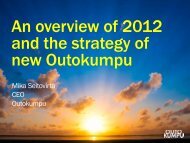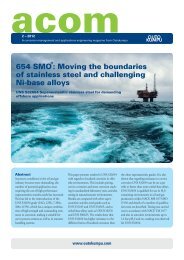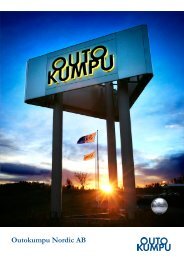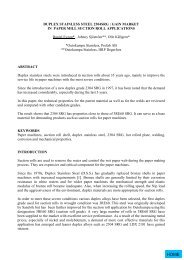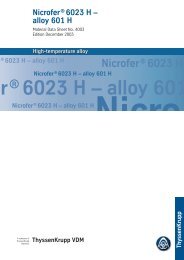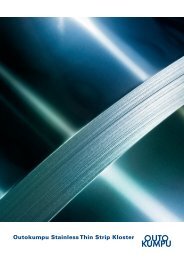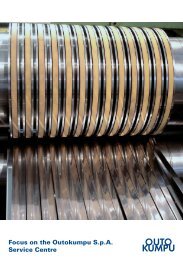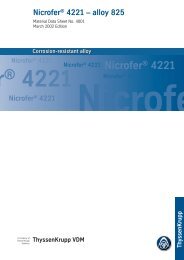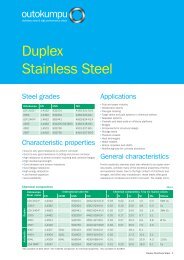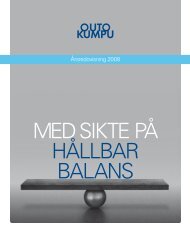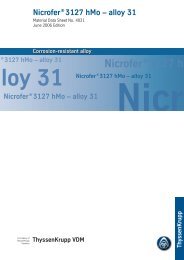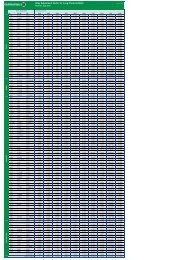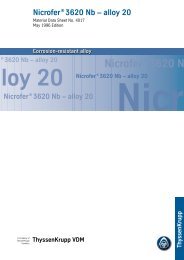Annual Report 2010 - Outokumpu
Annual Report 2010 - Outokumpu
Annual Report 2010 - Outokumpu
You also want an ePaper? Increase the reach of your titles
YUMPU automatically turns print PDFs into web optimized ePapers that Google loves.
76<br />
Carbon dioxide emissions under EU Emissions Trading Scheme were still at lower than normal level in <strong>2010</strong> due to<br />
reduced levels of production, approximately 795 000 tonnes (2009: 540 000 tonnes). <strong>Outokumpu</strong>'s carbon dioxide<br />
allowances in the UK, Sweden and Finland were sufficient for the Group's planned production.<br />
The EU Emissions Trading Scheme after 2012<br />
The European Commission (EC) and the European Parliament have agreed that the EU Emissions Trading Scheme<br />
(ETS) will continue, with the next trading period being 2013–2020. On the third emissions trading period, 2013–2020, the<br />
ETS will become a more restricting system. The total annual emission cap in Europe and share of free allocation of<br />
emissions will gradually decrease. Auctions will be the main form of issuing allowances. <strong>Outokumpu</strong>'s operations under<br />
ETS will continue to receive free allocations according to efficiency-based benchmarks and historical activity. It is<br />
estimated that Group will be some allowances short and that the situation will most likely vary more than before within<br />
Group companies. One important issue for <strong>Outokumpu</strong> has been to qualify for a free allocation of emissions allowances<br />
during 2013–2020 by being part of an industry sector where there is a significant risk of carbon leakage. According to an<br />
EC decision, all of <strong>Outokumpu</strong>'s ETS operations are currently qualified. Rules on how free allocations of emissions<br />
allowances are to be distributed will be finalised during 2011.<br />
The renewed ETS directive states that member states can offer companies compensation for carbon dioxide related<br />
increases in electricity prices. As <strong>Outokumpu</strong> has three electricity-intensive installations in three different EU countries,<br />
this is an important aspect.<br />
Read more about emissions trading.<br />
Voluntary energy efficiency agreements<br />
<strong>Outokumpu</strong> has participated in voluntary national energy efficiency agreements in Finland, Sweden and the UK for many<br />
years. The Tornio Works joined the Finnish programme at the beginning of the 1990s. Energy savings in electricity, heat<br />
and fuel achieved during <strong>2010</strong> totalled 961 GWh. To ensure that systematic improvements in energy efficiency continue<br />
to be achieved, <strong>Outokumpu</strong> sites in Finland signed new energy-efficiency agreements in December 2007 covering the<br />
2008–2016 period.<br />
In Sweden, the first round of the PFE (Programmet för energieffektivisering i energiintensiv industri) agreement – in<br />
which the target was annual savings in electricity consumption of 4 GWh – ended in the summer of 2009 with savings of<br />
8 GWh having been realised. The Group is a participant in the second period (2009–2014) of this agreement. In<br />
connection with energy issues, <strong>Outokumpu</strong> usually works closely with national authorities – with Motiva in Finland and by<br />
participating in the Jernkontoret forum in Sweden.<br />
<strong>Outokumpu</strong> <strong>Annual</strong> <strong>Report</strong> <strong>2010</strong> – Business – Energy efficiency



